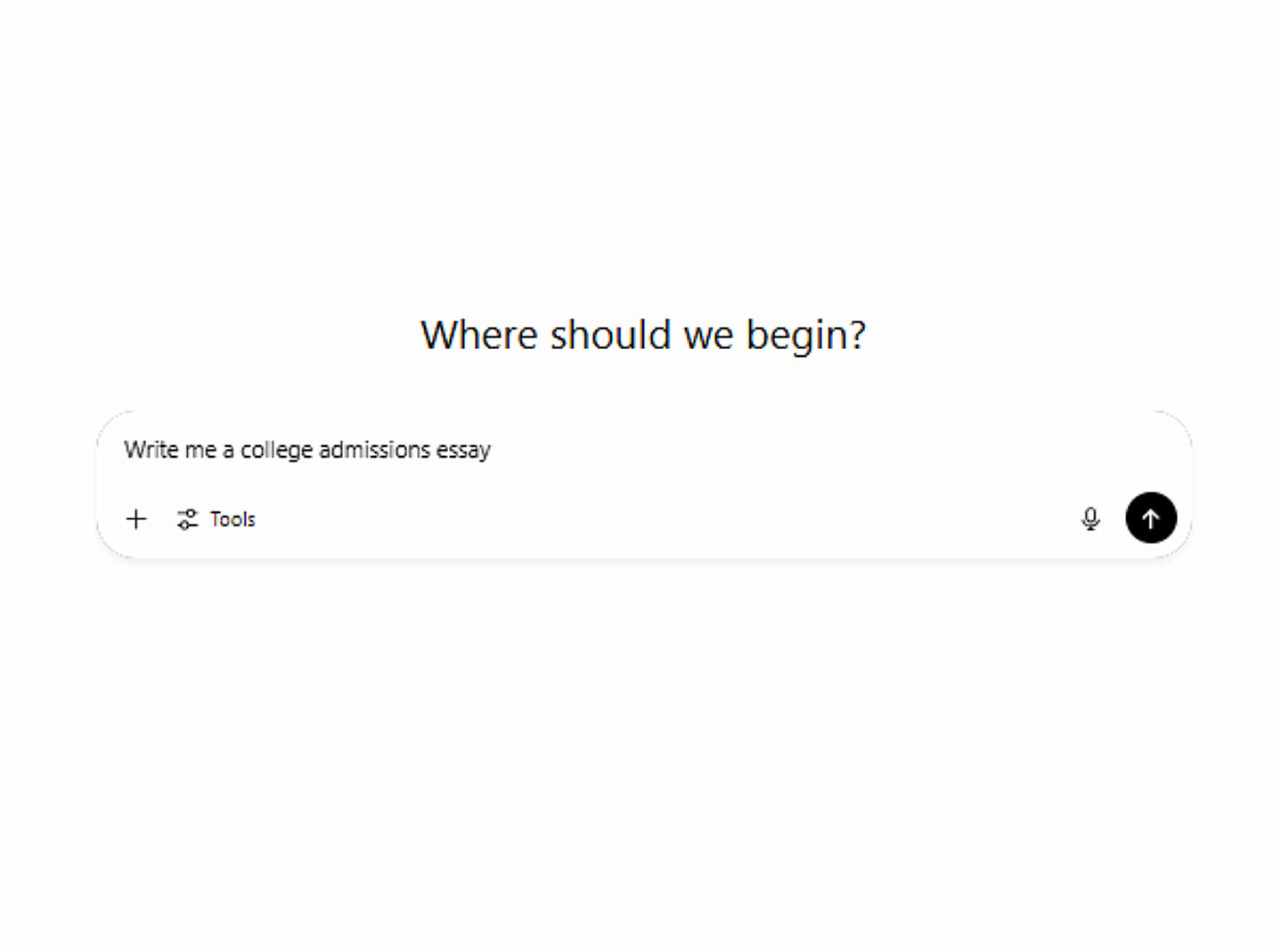
This year marks my ninth year coaching students on their college essays.
It also marks my first year coaching ChatGPT.
Passionate about the transformative power of writing, I signed up to teach three high school students how to outline and draft their college essays back in 2017. After studying countless Ivy League college application files and reading one too many David Sedaris essays, I felt that I had discovered the secret sauce to a great personal essay: reflection on experiences.
Over the next several years, I built a career helping students craft the perfect college essay, advancing through several college admissions consulting firms before launching my own company in 2022. I’ve helped some of America’s most anxious high schoolers bring out their unique stories on the page and taught immigrant students to write in their second or even their third languages. And while I may have forgotten the names of many of the students I’ve worked with over the past decade, I haven’t forgotten a single story I’ve helped bring to life: the girl who showed up to her chess tournament in a hot pink jacket, the boy who trained a pet chicken, the siblings who learned American Sign Languge to communicate with their grandmother. After all, writing is not just a medium of communication—it is the most powerful tool we have to immortalize our unique experiences.
[RELATED: Your Chatbot Is Not Tolstoy]
So, despite my many grievances with the American college admissions process, I will continue to sing my eulogies to the college essay for one simple reason: it is the only excuse we have to force students to learn how to write. Like or not, command over the written word is a student’s most important weapon, with study after study demonstrating that strong writing skills correlate not only with aptitude for critical thinking but also with potential for future success.
It is unclear, then, for how much longer our students will retain the capacity to think.
The American college admissions process has undergone a series of seismic changes since I first started college counseling in 2017. COVID-19 overhauled standardized testing in 2020, the College Board retired SAT subject tests in 2021, and the Supreme Court ruled against affirmative action in 2023. As college counselors, we’ve weathered the storm of all of these unprecedented events, but no one seems to know what to do about the recent rise of artificial intelligence (AI), which may be the death knell for all student writing.
Every July, I guide students through my time-tested process to get them ready for the upcoming college essay season. From brainstorming to drafting, my students learn the mechanics of a good sentence, the framework of a strong personal essay, and the key to standing out to college admissions officers. I’ve always believed that just about anyone can learn how to write with the proper toolkit and pedagogy, and I bask in the intellectual challenge of revamping even the weakest essays—after all, every single student has a story waiting to be heard.
But this year, something was different.
After taking students through the anatomy of a personal essay and the college essay process as a whole, I usually assign a seven-part brainstorming exercise that gets my students’ gears turning as they prepare to select a topic for the most important essay many of them will ever write in their lives. A compilation of tasks I’ve encountered throughout my counseling career, my brainstorming worksheet prompts students to consider their values, rank their opinions, and grapple with existential questions. The session where we review their responses is among one of my favorite parts of my job—it’s the moment we really get to know each other and discuss big ideas. But unlike in past years, where these conversations have offered a window into my students’ souls, this year, our interactions have felt bland, stale, and downright nerve-wrecking—many of my students arrive empty-headed, clueless about how to answer basic personal questions. And while I’ve always had an occasional student or two who struggles with reflection, I have never seen anything quite like this before: this year, almost every single one of my students doesn’t know what is important to them or what moments in the first eighteen years of their lives have shaped their identities. Simply put, these students lack basic critical thinking skills because they have never been asked to reflect deeply on anything in their entire lives.
Because they have never been asked to write.
At its core, writing is the surest way to develop a capacity for a higher order of thought. This year, however, marking my first cohort of high school students who lack the critical thinking prowess of their predecessors, welcomes a senior class who started high school in 2022—the year of ChatGPT’s public launch. In other words, these high school students are the first of their kind to have had AI tools at their disposal for the entirety of their high school careers. Many of my students, therefore, come to meetings with ChatGPT-written essays and look confused when I put them on the spot and ask them to generate an essay outline without the help of “Chat.” These are the same students who not only have never drafted an entire essay without the aid of AI tools, but have also never drafted an entire essay at all.
As soulless robot writing becomes virtually indistinguishable from the writing of the online generation, many teachers have responded by pivoting away from assigning longer-form essays at all, focusing instead on in-person assignments such as group projects or in-class presentations. And while these assignments might provide value of their own, they cannot replace the power of the written word.
[RELATED: We Need to Do Something About Student Writing]
Only through writing do students learn to think deeply about themselves and the world around them. How, then, can we expect students to know a thing about themselves—what they value, what they stand for, and who they are—if we never expose them to the only discipline that consistently wrestles with those very questions?
In deemphasizing the importance of writing, standing by and watching AI take over everything from ad copy to college essays, we have failed the next generation of thinkers. But if ChatGPT has accelerated the decline of student writing, then it is up to educators to preach the value of the written word not only as a medium of communication but also as a proxy for higher thought.
Our students deserve better than a future ghostwritten by machines. As AI accelerates and classrooms grow ever more allergic to rigor, educators and parents must decide whether to allow students to outsource their minds or to fight to preserve the one tool that has always made civilization possible.
I, for one, will keep on fighting.
Follow Liza Libes on X.
Cover by Jared Gould, screenshot of ChatGPT prompt
